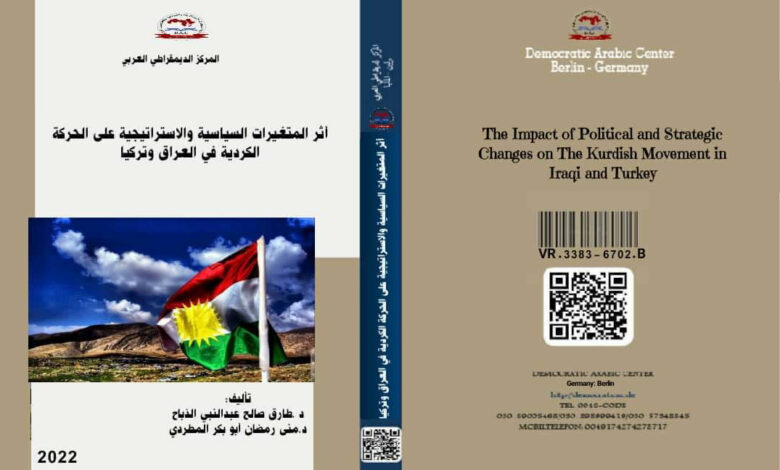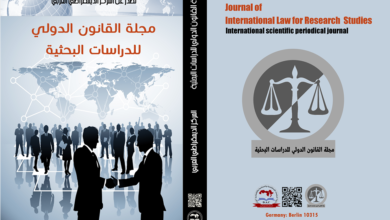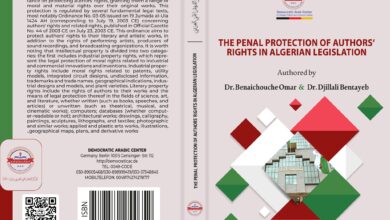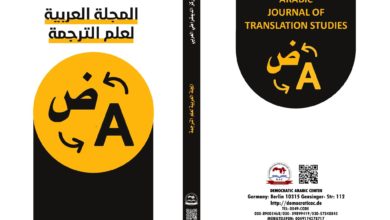أثر المتغيرات السياسية والاستراتيجية على الحركة الكردية في العراق وتركيا
The Impact of Political and Strategic Changes on The Kurdish Movement in Iraqi and Turkey

تأليف :
- د .طارق صالح عبدالنبي الذباح – استاذ العلوم السياسية المشارك كلية الاقتصادوالعلوم السياسية جامعة اجدابيا
- د.منى رمضان أبو بكر المطردي – استاذ العلوم السياسية المشارك الاكاديمية الليبية _بنغازي
نسخة “pdf”-
أثر المتغيرات السياسية والاستراتيجية على الحركة الكردية في العراق وتركيا
الطبعة الأولى “2022″ –من كتاب: – أثر المتغيرات السياسية والاستراتيجية على الحركة الكردية في العراق وتركيا
جميع حقوق الطبع محفوظة #المركز_الديمقراطي_العربي ولا يسمح بإعادة إصدار هذا الكتاب أو اي جزء منه أو تخزينه في نطاق إستعادة المعلومات أو نقله بأي شكل من الأشكال، دون إذن مسبق خطي من الناشر .
تقديم :
شهد عالم ما بعد الحرب الباردة تحولات جذرية في مفاهيم السياسة الدولية. لم تعد القضايا العسكرية التقليدية مهيمنة في الدراسات الأمنية والعلاقات الدولية ، بل تجاوزت القضايا والمفاهيم الجديدة المتعلقة بالجانب غير العسكري ، بما في ذلك قضية الأقليات والمجموعات العرقية والأمن الإقليمي وغيرها. تعتبر قضية الأقليات من أهم القضايا التي بدأت بالظهور بشكل ملحوظ على الساحة الدولية ، ابتداء من سبعينيات القرن الماضي. نتيجة للتطورات التي حدثت في النظام الدولي والحروب التي حدثت ، والتي أدت إلى ظهور مشكلة الأقليات ، حتى أصبحت قضية دولية لا داخلية. ظهرت “صحوة الأقليات” وأدت إلى اندلاع موجة من الثورات والصراعات العرقية والقومية والدينية والطائفية في كثير من البلدان. كما شهدت السنوات القليلة الماضية اهتماماً بقضية حقوق الإنسان ، حيث اكتسبت هذه القضية مكانة دولية بالغة الأهمية ، وعقدت العديد من المؤتمرات الدولية حول حقوق الإنسان والأقليات. لقد تم تجريد مفهوم سيادة الدولة من معناه نتيجة التدخلات التي قامت بها قوة دولية كبرى من أجل حماية قومية معينة ، بالإضافة إلى التعديلات التي تم إجراؤها على العديد من الدساتير لتتماشى مع ما هو موجود. المنصوص عليها في المواثيق والإعلانات الدولية الخاصة بحقوق الإنسان. ولعل أهم نقطة تبرز عند الحديث عن قضية الأقليات هي ارتباطها بقضية الوحدة الوطنية واستقرار الدول التي تتواجد فيها وحتى الاستقرار الإقليمي والدولي.
لذلك تركز الدراسة الحالية على قضية الأكراد وخاصة أكراد العراق وتركيا. اتسم الوضع في كردستان العراق قبل احتلال الكويت بنوع من الاستقرار فرضته القوة والهدوء النسبي. كما اضطرت حركة التحرير الكردية المسلحة إلى ترك قدراتها وقواعدها الرئيسية في كردستان العراق واللجوء إلى المناطق الحدودية الإيرانية والتركية ، بعد أن تعرضت تلك القواعد لهجوم شامل من قبل الجيش العراقي قبل توقف الحرب الإيرانية العراقية عام 1988. ، وتقلص النشاط العسكري بشكل كبير. إلا أن منطقة العراق شهدت ابتداء من عام 1990 العديد من الأحداث التي لم يشهدها الشعب الكردي على مر العصور ، حيث شكلت الحركة القومية الكردية هاجساً أمنياً وسياسياً واجتماعياً لغالبية حكومات الدول التي يوجد بها أقلية كردية.. يعتبر أكراد العراق وتركيا على وجه الخصوص من العوامل المهمة والسلبية التي تؤثر على علاقات بغداد مع الدول التي يتواجد فيها الأكراد من خلال الأحداث التي وقعت على مستوى الصراع الكردي الكردي. وكذلك على مستوى الصراع الكردي مع الحكومتين العراقية والتركية. بالإضافة إلى مستوى الصراع الإقليمي والدولي.
Abstract
The post-Cold War world has witnessed radical transformations in the concepts of international politics. The traditional military issues are no longer dominant in security studies and international relations, but have gone beyond to new issues and concepts concerned with the non-military aspect, including the issue of minorities, ethnic groups, regional security and others. The issue of minorities is one of the most important issues that began to emerge significantly on the international scene, starting in the seventies of the last century.As a result of the developments that took place in the international system and the wars that occurred, which led to the emergence of the problem of minorities, so that it became an international issue, not an internal one. The “Awakening of Minorities” appeared and led to the emergence of a wave of revolutions and ethnic, national, religious and sectarian conflicts in many countries. The past few years have also witnessed interest in the issue of human rights, as this issue has gained a very important international status, and many international conferences have been held on human rights and minorities. The concept of state sovereignty has been stripped of its meaning as a result of the interventions carried out by a major international power in order to protect a particular nationalism, in addition to the amendments that are made to many constitutions to come in line with what is stipulated in international charters and declarations on human rights. Perhaps the most important point that arises when talking about the issue of minorities is its connection to the issue of national unity, the stability of the countries in which they are located, and even regional and international stability.
Therefore, the current study focuses on the issue of the Kurds, especially the Kurds of Iraq and Turkey. The situation in Iraqi Kurdistan before the occupation of Kuwait was characterized by a kind of stability imposed by force and relative calm. As the armed Kurdish liberation movement was forced to leave its main capabilities and bases in Iraqi Kurdistan and resort to the Iranian and Turkish border areas, after those bases were subjected to a comprehensive attack by the Iraqi army before the Iran-Iraq war stopped in 1988, and military activity was greatly reduced. However, the region of Iraq witnessed, starting in 1990, many events that the Kurdish people have not witnessed throughout the ages, as the Kurdish national movement formed a security, political and social concern for the majority of the governments of the countries in which they are located.
The Kurds of Iraq and Turkey in particular are one of the important and negative factors affecting Baghdad’s relations with the countries in which the Kurds are present through the events that took place at the level of the Kurdish-Kurdish conflict; As well as at the level of the Kurdish conflict with the Iraqi and Turkish governments; In addition to the level of regional and international conflict.
- الناشر: المركز الديمقراطي العربي للدراسات الإستراتيجية والسياسية والاقتصادية





